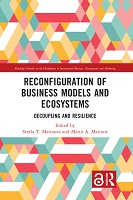Chapter 9 Tensions of Coopetition and Integration into the Multiplatform Ecosystems in Digital Care
Proposal review
Author(s)
Mohamed, Mahmoud
Ahokangas, Petri
Pikkarainen, Minna
Language
EnglishAbstract
Decoupling of business models and ecosystems is the disconnection of certain characteristic activities originally planned and completed in coincidence. It could bring in an immense adverse shock in the functioning of established business models and ecosystems possibly bringing them to resilience. Core causes for decoupling and resilience of business models and ecosystems are jolts, known as global crisis, universal pandemics, etc. The undesirable outcomes of critical events can reveal unique circumstances for business model and ecosystem resilience. Business model and ecosystem resilience represents a mandatory prerequisite for firms challenging their functioning and even very existence. Research has been conducted thus far, nevertheless this theme requires significantly more consideration. The key objective of this book is to bring further insights in the field delivering a thorough examination of the ways in which business models and ecosystems can develop resilience under extraordinary conditions. In the book, the resilience of business models and ecosystems is analysed aiming to investigate further the specifics of the relevant processes securing resilience and its outcomes. The resilience of business models and ecosystems is scrutinised as a credible way for enhancing the predispositions of firm’s survivability.
Keywords
Business Models, Ecosystems, Resilience, Decoupling, Economic Volatility, Business Model Innovation, Value Creation, Value Capture, Entrepreneurship, Open BankingDOI
10.4324/9781003326731-9ISBN
9781032354026, 9781032354064, 9781003326731Publisher
Taylor & FrancisPublisher website
https://taylorandfrancis.com/Publication date and place
2023Imprint
RoutledgeClassification
Business and Management
International business


 Download
Download